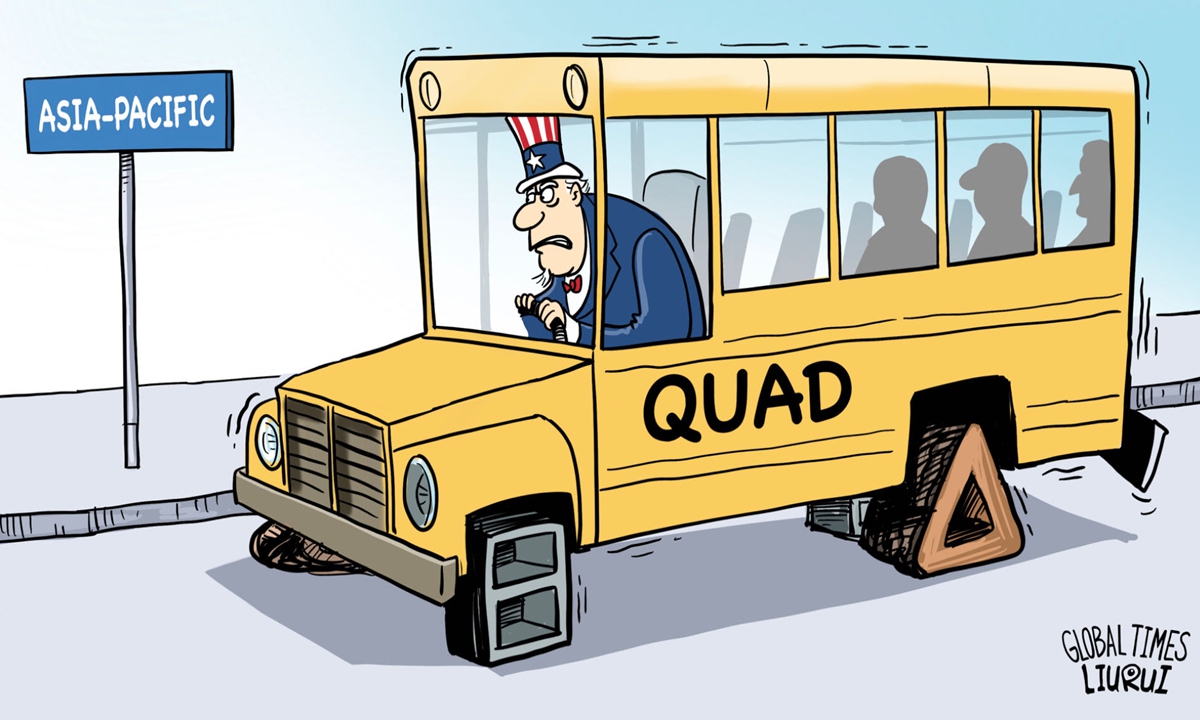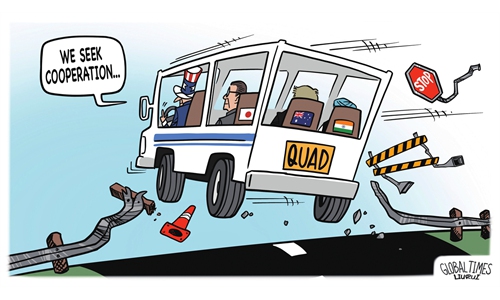The Quad taking China as a target is destined not to go far: Global Times editorial

Head to nowhere. Illustration: Liu Rui/GT
The leaders of the US, Japan, India and Australia met for the Quad Leaders Summit in the US on Saturday, local time. Although the White House strongly denied that the Quad mechanism is merely a tool for the US to limit China in the "Indo-Pacific region," and US National Security Advisor Jake Sullivan claimed that "the Quad isn't really about any other country," soon after the beginning of Saturday's Quad leaders' meeting, a camera feed picked up US Secretary of State Antony Blinken announcing the first topic: China, as participants thought reporters were out of earshot. Everyone knows that the Quad summit is aimed at China, but the participants want to cover it up, demonstrating how the encirclement of China enjoys little support in the international arena.The joint statement issued by the leaders of the four countries did not directly mention China. It expressed "serious concern" about the situation in the East and the South China Seas, and condemned "coercive and intimidating maneuvers" in the South China Sea, but did not clearly name who took action. In addition, the four leaders announced plans to strengthen cooperation in maritime safety and security, enhance the interoperability of the maritime security organizations of the Quad countries, provide maritime monitoring technology to other Indo-Pacific nations, and launch joint coast guard patrols next year.
Although Western public opinion had previously heightened the rhetoric surrounding the meeting "to deal with aggressive China," we see that, apart from continuing to hype the "China threat" and "Indo-Pacific crisis" theories behind closed doors, the Quad summit is unable to come up with anything fresh and substantive. The so-called joint implementation of the coast guard mission has been in the works for a long time. As for the Quad's claim of contributing to the region's "freedom and openness," it is even more illusory and difficult to discern.
Many analysts believe that the more important agenda of the Quad summit is for the leaders of the four countries to come together and express their support for the continuation of the Quad mechanism in the future. With elections approaching in three of the four countries, this dialogue will be the last meeting of the current leaders.
Washington certainly hopes to leave a political legacy at this time, and the other three countries also made some diplomatic remarks. However, many foreign media outlets, including Nikkei Asia, have pointed out that whether the four countries can continue to maintain close interaction under the relevant mechanisms in the future remains to be seen and "hype cannot obscure the Quad's existential crisis."
The Quad, as a flagship project of the "Indo-Pacific Strategy," has been "revived" under US leadership for three years now. Looking back over these three years, aside from a few meetings and statements, little concrete progress has been made in the six Quad working groups established to address "global challenges" and the Quad "seems adrift." This is not surprising at all.
A small circle attempting to contain China on security issues and exclude it on economic matters in the region, while loudly proclaiming the goal of "building a free and open Indo-Pacific," is actually engaging in crude interference in regional affairs, which goes against the trend of the times and contradicts the wishes of regional countries.
The Quad's situation is also a microcosm of the closed and exclusive small circles that the US has pieced together around China. Western, especially American, public opinion attributes the slower-than-expected development of the Quad to India's "independence and autonomy," accusing New Delhi of leveraging its relationship with the US for its own benefit, which undermines the concept of a "strategic alliance." In reality, among the four countries, which one - including the US itself - does not have its own national interests to consider when facing China? Which country can truly "decouple" from China or "exclude China"? China is the main trading partner for the vast majority of countries in the region and is also a major contributor to regional peace and stability. Discussing security and development without China yields no substantial meaning beyond empty talk. Moreover, artificially creating tensions and inciting confrontation with China is bound to be unpopular.
Some analyses suggest that the Quad summit attempts to counter the so-called "China threat" without "irritating China." In fact, Washington's actions reveal that it must consider not only China but also the reactions of regional countries and the international community. Rather than trying to conceal its intentions, the US should return to a trend of peace and cooperation in the Asia-Pacific as soon as possible. The US has already committed to not seeking a new Cold War or opposing China through strengthened alliances. Whether its words align with its actions is being observed not only by China but by the entire international community.

